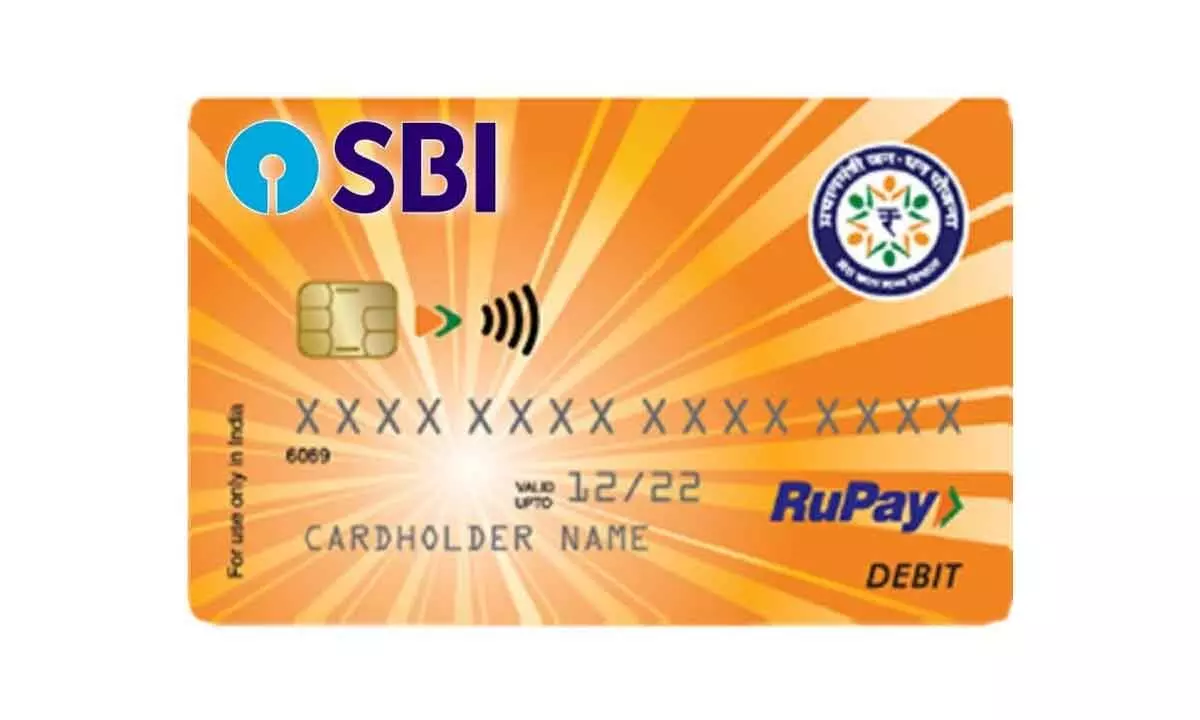SBI still sits on Rs 164-cr UPI fee from Jan Dhans
India’s largest lender collected `17.70 fee on every UPI transaction; Same amount charged for every cash withdrawal beyond 4 in a month
image for illustrative purpose

The unreasonable charges imposed on Jan Dhan accountholders, along with due interest, should truthfully refunded to the marginalised depositors without further delay - Dr Ashish Das, professor at IIT-B
Mumbai: The State Bank of India (SBI), India’s largest lender, has been wrongfully withholding over Rs164 crore from many of the 12-crore Jan Dhan account holders for the past five years. The banking major mopped up this amount by collecting a fee of Rs17.70 on every UPI transaction carried out by Jan Dhan account holders during April 2017 to September 2020. The banking major has not yet returned this amount to account holders though levying such a fee is against RBI’s rules.
Talking to Bizz Buzz, Ashish Das, Professor at IIT Bombay,who wrote a report on this issue a few years ago, said, “SBI is wrongfully withholding over Rs164 crore from many of the 12- crore underprivileged BSBD accountholders, for the fees collected at Rs17.70 on every UPI transaction”.
In the interest of the protection of bank consumers, for which regulations have been put in place, it is our responsibility to protect the rights and interests of these account holders from poor backgrounds. We need to ensure that the undue charges imposed, along with due interest, are truthfully refunded to the marginalised depositors without further delay, he said.
According to the report by Prof Ashish Das, SBI had collected over Rs254 crore towards at least 14 crore UPI/ RuPay transactions by charging on BSBD (Basic Savings Bank Deposit) account customers under the Pradhan Mantri Jan Dhan Yojana (PMJDY). However, SBI refunded Rs90.19 crore for charges imposed on 5 crore UPI and RuPay debit card digital transactions conducted between January and September 2020. However, it did not return the UPI charges collected before January 2020.
Since June 2017, unlike any other bank in India, SBI charged Rs17.70 for every withdrawal beyond four a month. The November 2021 report shed light on SBI’s questionable practices of collecting excessive charges. The report highlighted that these charges were unjustifiable for digital transactions and violated the regulations set by the Reserve Bank of India (RBI). Such changes imposed were detrimental to the BSBD accountholders of SBI who had embraced digital financial transactions as per the government and RBI’s recommendations.
Das highlighted that although charging Rs17.70 for UPI transactions might seem unreasonable, RBI chose not to evaluate the board’s decision-making process regarding the fairness of the service charge for digital withdrawals through UPI.
Former RBI Deputy Governor SS Mundra recently released another report in May 2024, authored by Das, which focused on assessing the reasonableness of service charges. This report specifically examined SBI’s unreasonable charges related to UPI transactions. RBI granted banks the flexibility to either offer free additional withdrawals or charge for them beyond the limit of four per month for BSBD accounts.
However, the service charges imposed by banks must adhere to regulatory requirements, ensuring they are reasonable based on the average cost of providing the service. The responsibility of approving these proposed charges and assessing their reasonableness lies with the Board of Directors of the respective banks.
Das argues that SBI’s decision to charge Rs17.70 for cash withdrawals through different modes was reasonable, but it was unjust to impose the same charge on ‘unassisted’ non-cash UPI payments, especially for underprivileged BSBD accountholders. As of January 2020, a new law prohibited banks from levying charges on UPI and RuPay debit card payments.
Subsequently, Das sought the rationale provided by the SBI-board in approving Rs15 (plus service tax) per withdrawal made through the digital means. Following a directive from the Central Information Commission (CIC), SBI was compelled to disclose the relevant information.
The CIC order specifically mentioned about SBI’s Chief Public Information Officer (CPIO) arguing for charges imposed on cash withdrawals, but not on UPI transactions. The report highlighted SBI’s recent revelation that contradicted its earlier press statement, which stated that the bank was compliant with the regulatory directives.
The information disclosed by SBI indicated that there was no proposal or board approval for charging fees on non-cash UPI withdrawals. The approved charges were solely for cash withdrawals at Rs17.70. The bank displayed approved cash withdrawal charges only on its website and physical outlets, with no mention of service charges for non-cash withdrawals.
The exploitation of vulnerable members of society through SBI’s BSBD accounts is a clear example of injustice, raising concerns about the bank’s integrity. To date, neither the government nor the RBI has addressed SBI’s failure to comply with regulatory requirements, which has adversely impacted these unsuspecting depositors.

